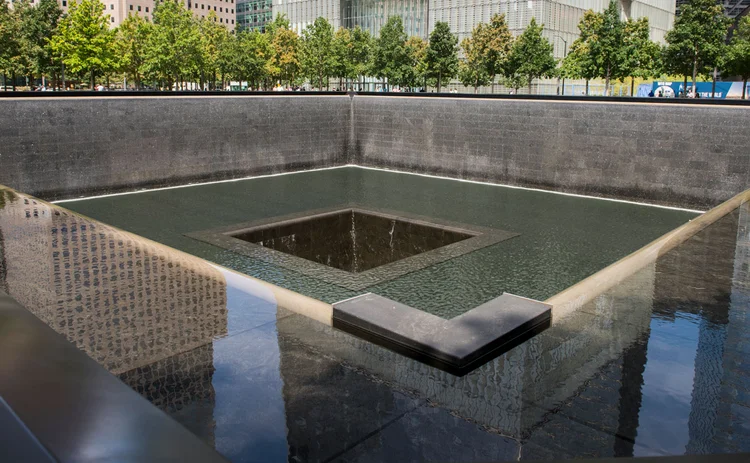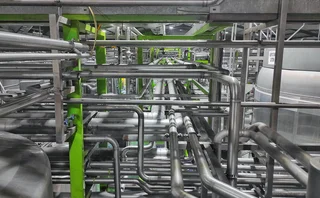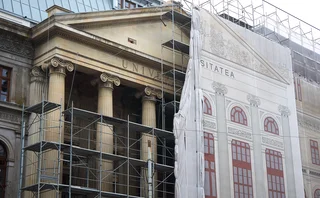
David Osborn
UK Metropolitan Police family liaison co-ordinator, Risk Waters

On the morning of September 11th, I had been giving evidence in a murder trial at the Old Bailey. In an era before smartphones, I was unaware of the events unfolding in New York, and returned to my office at Scotland Yard that afternoon to find it packed with people surrounding a television, watching a live news feed from America.
As it happened, I was working on the same floor as the team overseeing the force’s family liaison officers – the people who do the vital, human job of forming a relationship with families who have lost loved ones in violent and unexpected circumstances, including mass disasters. First, conveying the dreadful news, then making sure the family are sensitively supported, looked after and given timely information as an investigation unfolds.
I knew the team well from my time conducting murder investigations and, drawing on my own experience working with bereaved families throughout my career, I’d had a hand in creating the job of family liaison co-ordinator.
Although the events were in New York, it was obvious that there would be British people affected. A ‘casualty bureau’ was quickly set up, with phone lines manned 24/7 for anxious relatives to call. It soon became clear that many UK families were deeply concerned about relatives there. I offered to help.
I was not immediately attached to the team, and instead watched helplessly as the family liaison office struggled to get to grips with the enormity of what was unfolding in New York, and the devastating impact on UK families. What stands out in my mind, even at this distance, is the frozen look on the face of the constable who walked into my office on September 14, returning from a visit to a company called Risk Waters, who told me the company had lost perhaps 264 staff and delegates at a conference, many of them London-based.
That afternoon I was sitting in Risk’s Haymarket office with Pauline Coutts, the director of human resources, listening to their horror story unfold for myself.
As I write about my experience of September 11th in the paragraphs below, I am conscious that I didn’t lose anyone in it that I loved. My narrative is not a comparison to that of the 35 UK families I responded to who each lost a loved one, but I write to provide a narrative from a different perspective on those days and weeks that followed. To those who lost their loved ones I still send my heartfelt thoughts. Many of your faces and our conversations remain etched in my mind. You faced your experience in the spotlight of the world’s media and with wall-to-wall coverage. I can’t ever imagine what that was like for you.
Supporting the investigation
A police casualty bureau is responsible for recording the names and details of those reported missing. While every person who submits an enquiry will get an officer allocated to them in the ensuing investigation, immediate families are of course prioritised. Businesses are generally responded to later, on the assumption that their employees’ families will already have made contact with the police and are being directly supported. But the case of Risk Waters was unique in so many respects; they clearly needed their own dedicated response, and someone to act as the fulcrum between them, their affected families and the investigation in New York.
By the time I arrived at Risk Waters, staff had already taken the initiative and called every company on their delegate list. Publishing directors Celine Connell – who took responsibility for liaising with employees’ families, many of them her own staff – and Tony Gibson, who took it on himself to try and track down each of the 242 delegates who’d said they would be attending. Every individual was noted on a spreadsheet as ‘Did not attend’ (144), ‘Not accounted for’ (68), and ‘Awaiting information’ (30).
That was a huge help. But the machinery of a major criminal investigation needs verifiable facts, too; names, phone numbers, hotel details, who precisely had spoken to whom that day and when, and so on. While it was known that around 40 delegates had registered in advance and 20 speakers were on the agenda, no-one knew who had actually made it to the conference at the time of the attacks.
That first afternoon, late into the night, Pauline and I worked line by line through an alphabetical list of names of those who could be missing, trying to verify what was known about each of them. Everything had to be checked and cross-checked, so that the families weren’t inadvertently passed false hope, and the job of identifying the missing stood chances of early success.
The process of working through a long list of names unfortunately takes time, especially so when faxes and pagers still preceded widespread email and mobile communication – but, slowly, we made progress. I was deeply conscious Pauline had no way to shield herself and her own grieving. Every now and then she would need a break, to step outside.
While the loss of staff at Risk Waters was primarily a tragedy for their families, it was hugely affecting for their colleagues too. Risk was a relatively small company in terms of staff numbers, and everyone knew everybody else. The mood within the building was of stunned disbelief. Those that had travelled for the conference weren’t colleagues based in another country, they were friends they sat next to each working day, friends they laughed with and drank with – friends whose desks were still full of reminders of their presence, starkly visible within the office.
Day after day, as we sat together in a meeting room at Haymarket House, I was aware of the significant demands I placed on Pauline and her young support team, including Claire Mason, Suzanne Peacock and Sian Johnson, and I often wonder whether others know how much they gave so that the families of those lost at the conference received the best possible care from Risk Waters, even at a time when the company itself was reeling from its collective trauma. I am grateful that my connection with Pauline at this time of year endures still.
Reflecting
The early days of any disaster are focussed on the belief that there will be survivors, even while news coverage shows the seeming impossibility of it. Here, the hopes were that loved ones would be found safe in the underground voids below the towers, unconscious in hospital, or walking the streets with amnesia. To share with families that their hope was in vain, that within a few days, investigators in New York were already working on an ‘assumption of death’ policy, is amongst the hardest things that my family liaison colleagues had to do.
In time, the rescue operation became a recovery operation. DNA samples from toothbrushes and hairbrushes had to be sensitively sought from grieving families, and identification forms giving the smallest identifying features had to be filled in. In compiling the smallest of identifying details, visits to dentists and GPs were standard. Nothing would have prepared families for these questions.
And nothing on this scale had ever been anticipated or prepared for by UK police. There is no single policy applied to mass disasters or murder investigations, and new protocols were being developed almost daily in conjunction with different UK and international agencies.
Travel plans for the families that wished to go to New York, arrangement of flights and hotels, memorial services, both private and national, visits to offices, return of possessions, referrals to professional support services and other agencies like the Red Cross, victim support, local authorities and bereavement agencies – and of course the confidential and respectful repatriation and transfer of those lost to their final resting place – all fall to family liaison officers, as they supported each family as they needed or wished it to be.
Media strategies that met the desire of each family needed to be established as the press clamoured, sadly often insensitively, for details. Some families wished to actively use the media in the hope of focussing the search for their missing loved one; others wanted nothing to do with them.
The worn blue notebook I still keep from those days records the frequent calls to each of my officers, one assigned to each bereaved family, to check their needs were met – and to ensure the officers themselves were getting the specific support they needed from their own line managers and constabularies, because the investigation placed huge demands on them. With the time difference in New York, it became routine for me to be making and receiving calls with American colleagues late into the night, so that updates could be passed to families as soon as possible, especially when any identification was made. Weekends became just another working day; my phone rang ceaselessly, irrespective of the hour, every call was answered. On the rare occasions that I was out with my own family in the weeks after the attacks, we took two cars, in case I had to leave them and head back to the office.
As the weeks went by, I think I met all of the bereaved families that my FLOs were working for, either in their homes or at memorial services. I was honoured to deliver to some the urn of ashes from Ground Zero and the folded American flag offered to each family, and was humbled and moved by their kindnesses to me, when all I wanted as a father myself was to wish that this moment wasn’t happening to them.
Seven weeks after September 11, I took a few days out from my office. Before I joined the police, I had always wanted to be a farmer, and in need of a mental break I went with my old farming employer and friend, godfather of my eldest son, to his cottage tucked remotely away, miles from anywhere, in the hills of the tiny Welsh hamlet of Abergwesyn. The local milkman, a good friend when we visited, was curious why we were there in the dark depths of November; telling him of my involvement in the response to the New York attacks without mentioning any names of those I had been involved with, he told me how a family he had known since childhood, who used to stay in a caravan on his parents’ farm, had lost their daughter in the attacks. Inwardly, I recognised the name as a member of Risk’s London office. Sometimes the world is incredibly small.
This year, as always, I will reflect and remember the humbling experience of the more than 200 families I have met through tragedy. I will remember that scream that is like no other when they learn they have unexpectedly lost someone through violence. I will also remember their tears and their bravery, their confusion and their own compassion to police officers who work so closely with them, and I will remember, too, the people I met who operated in the background to support the bereaved. I will think of Pauline and her team.
I will also remember the many family liaison officers of 9/11 and other disasters I worked on, who saw so much, gave so much, and held so much, and who did what they could, sometimes at great personal cost, because sitting beside those who are inside the deepest depths of distress is simply the right thing to do. Because although 20 years have passed since 9/11, some things don’t get left behind.
If you would like to view all the articles in our 9/11 commemoration, click here
Only users who have a paid subscription or are part of a corporate subscription are able to print or copy content.
To access these options, along with all other subscription benefits, please contact info@risk.net or view our subscription options here: http://subscriptions.risk.net/subscribe
You are currently unable to print this content. Please contact info@risk.net to find out more.
You are currently unable to copy this content. Please contact info@risk.net to find out more.
Copyright Infopro Digital Limited. All rights reserved.
As outlined in our terms and conditions, https://www.infopro-digital.com/terms-and-conditions/subscriptions/ (point 2.4), printing is limited to a single copy.
If you would like to purchase additional rights please email info@risk.net
Copyright Infopro Digital Limited. All rights reserved.
You may share this content using our article tools. As outlined in our terms and conditions, https://www.infopro-digital.com/terms-and-conditions/subscriptions/ (clause 2.4), an Authorised User may only make one copy of the materials for their own personal use. You must also comply with the restrictions in clause 2.5.
If you would like to purchase additional rights please email info@risk.net
More on Comment
Beyond the hype, tokenisation can fix the pipework
Blockchain tech offers slicker and cheaper ops for illiquid assets, explains digital expert
Rethinking model validation for GenAI governance
A US model risk leader outlines how banks can recalibrate existing supervisory standards
Malkiel’s monkeys: a better benchmark for manager skill
A well-known experiment points to an alternative way to assess stock-picker performance, say iM Global Partner’s Luc Dumontier and Joan Serfaty
The state of IMA: great expectations meet reality
Latest trading book rules overhaul internal models approach, but most banks are opting out. Two risk experts explore why
How geopolitical risk turned into a systemic stress test
Conflict over resources is reshaping markets in a way that goes beyond occasional risk premia
Op risk data: FIS pays the price for Worldpay synergy slip-up
Also: Liberty Mutual rings up record age bias case; Nationwide’s fraud failings. Data by ORX News
What the Tokyo data cornucopia reveals about market impact
New research confirms universality of one of the most non-intuitive concepts in quant finance
Allocating financing costs: centralised vs decentralised treasury
Centralisation can boost efficiency when coupled with an effective pricing and attribution framework







